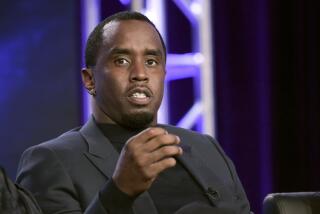Attorney Plans to Call Players in Drug Trial
- Share via
PITTSBURGH — The attorney for one of seven men indicted in a federal investigation of drug trafficking involving major league baseball players said Friday that he plans to call ballplayers to testify at his client’s trial.
“This involves ballplayers,” attorney Adam Renfroe Jr. said. “This whole thing is about ballplayers.”
Renfroe represents Curtis Strong, a Philadelphia caterer charged with 16 counts of cocaine distribution.
Renfroe also said that prosecutors were shielding players in the probe “because no one wants to destroy apple pie, hot dogs or baseball.”
Strong was indicted after federal authorities had listened to tape recordings of alleged drug deals made while a witness, reportedly a major league player cooperating in the probe, wore a hidden microphone, according to sources who asked not to be identified.
At least 11 players testified during the 15-month grand jury investigation, but no players were implicated when indictments were issued May 30.
Federal prosecutors have hinted that the only way players’ names will become public is through court testimony. Attorneys and others familiar with the investigation, however, say there is little doubt that the charges evolved from alleged drug deals involving players.
Renfroe said that Strong, who briefly catered food in the Philadelphia Phillies’ clubhouse this season, has been set up as a scapegoat to take the rap for others who have avoided prosecution.
Strong is to appear Monday for arraignment before U.S. Magistrate Ila Jeanne Sensenich in Pittsburgh. A trial date is expected to be set then.
Trial dates already have been set for three of the suspects, including an unemployed Pittsburgh photographer, Dale Shiffman, who faces 111 of the 165 charges issued by the grand jury.
Baseball players could be called to the witness stand as early as the week of July 8 during the trial of Jeffrey Mosco.
Mosco, 30, who formerly worked as a bartender at a Pittsburgh nightclub frequented by ballplayers, faces 12 charges of distributing cocaine.
Mosco’s attorney, Stanton Levenson, has also said that he expects players to be called as trial witnesses.
Last week, Renfroe said he believed that a player had implicated Strong, adding, “I am anxiously awaiting the time that I can cross-examine that ballplayer.”
Renfroe said in a telephone interview Thursday that prosecutors have gone too far in protecting the identity of players who may be drug users.
The indictments against the seven men list only the dates of the alleged drug transactions and do not detail names, times or sites--highly unusual for a federal investigation of this length and expense, according to attorneys who have reviewed the indictments.
“My mother has told me that I’ve talked too much about this, that I’ve run my mouth too much,” Renfroe said. “But in a situation like this . . . I plan to take the offensive.
“Why weren’t players named? Because no one wants to destroy apple pie, hot dogs or baseball. And that’s a fact. It’s hard for me to remain quiet in a situation where my client’s name and face are being heard and seen by 60 million television viewers across the country.”
The trials of Shiffman, 33, and Shelby Greer, 29, are scheduled to begin the week of July 22, with one being heard after the other by Judge Barron McCune. Federal authorities testified during bond hearings that both men sustained themselves financially solely through gambling and the distribution of narcotics.
FBI agent Wells L. Morrison also testified that investigators found a drug dealer’s handbook and a book containing reported narcotics sales records in Shiffman’s apartment after his arrest.
One witness is said to have spent $100,000 on cocaine through Shiffman over a two-year period, according to the government.
Of the 111 counts against Shiffman, 87 match dates when the Pirates either played games or had a day off in Pittsburgh during the 1983 season.
Greer, meanwhile, allegedly traveled from city to city, including six with major league baseball teams, to deal drugs and “supported himself solely through the distribution of cocaine and gambling,” FBI agent Robert Craig testified at a hearing May 31.
More to Read
Go beyond the scoreboard
Get the latest on L.A.'s teams in the daily Sports Report newsletter.
You may occasionally receive promotional content from the Los Angeles Times.










